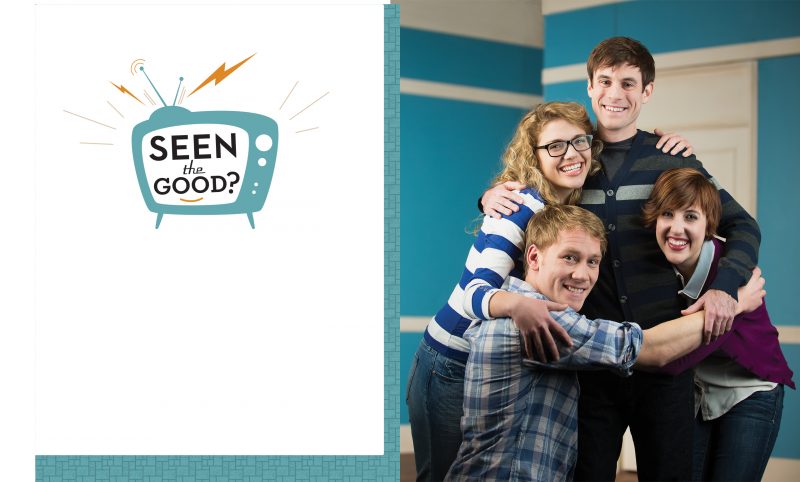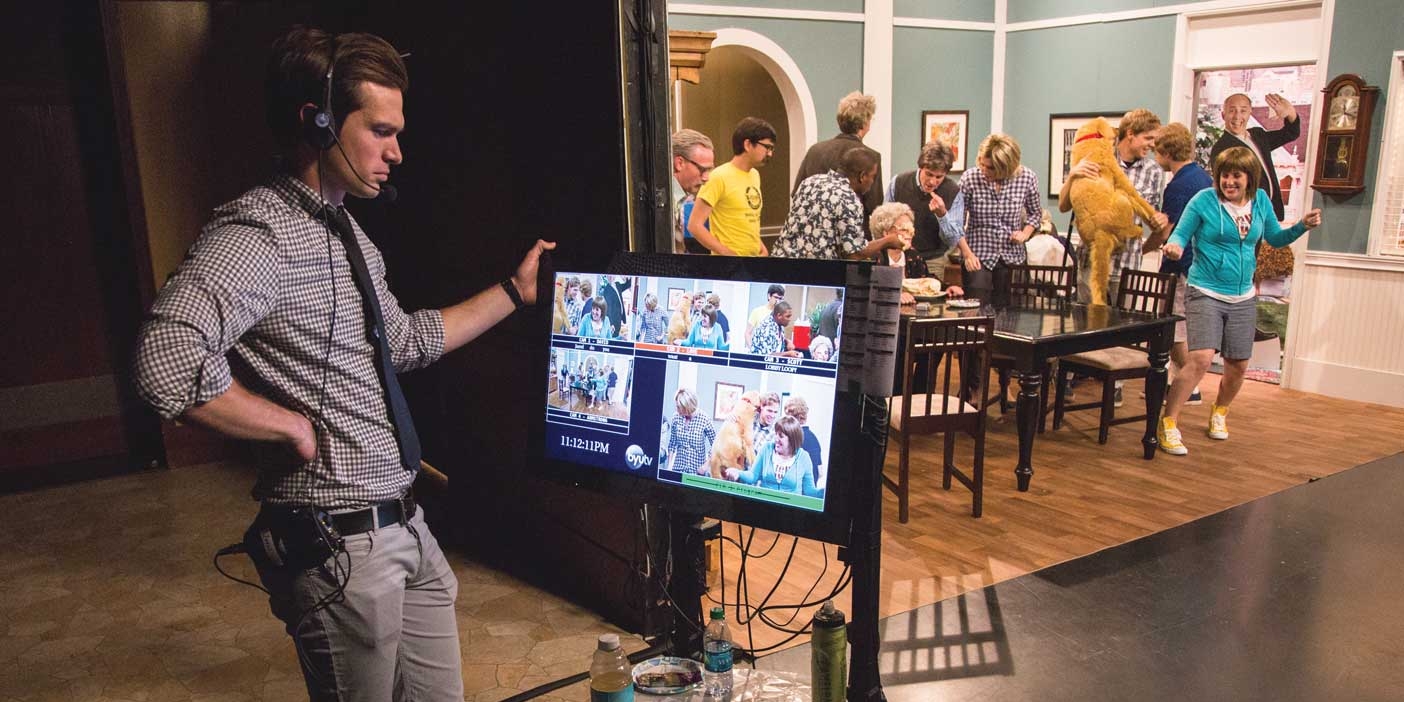The Wizards of Ha-Has
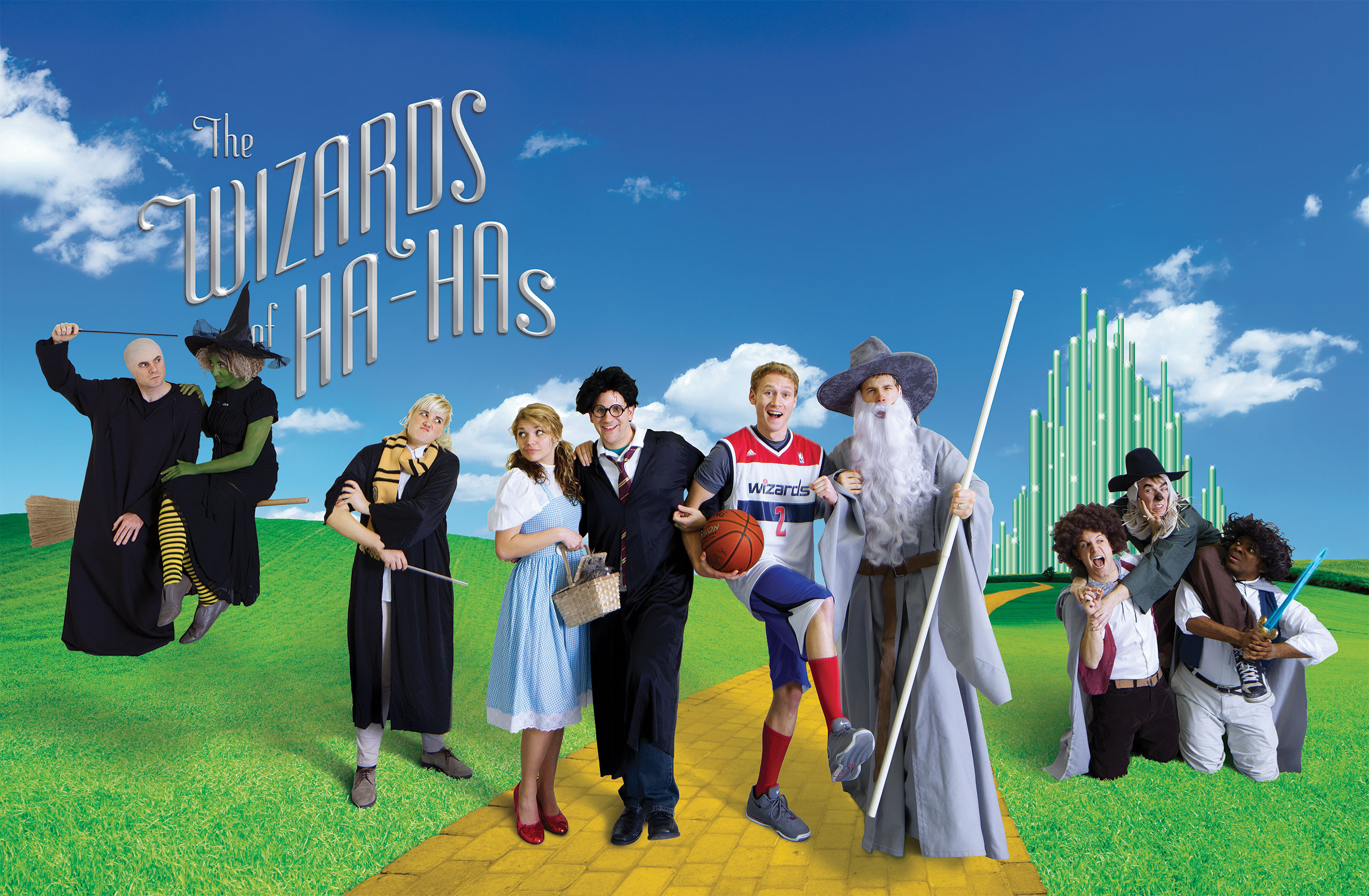
The Wizards of Ha-Has
With its enchanting blend of pop culture and campus life, BYU’s Divine Comedy conjures laughs in Provo and far from Happy Valley.
By Peter B. Gardner (BA ’98) in the Spring 2012 Issue
For a group of students featuring exactly zero music/dance/theatre majors, there’s an awful lot of five-six-seven-eight-ing happening on the floor of the Tanner Building auditorium. It’s a mid-semester Thursday night, and on Friday at 7, the 344-seat auditorium will brim with an amped audience expecting big laughs from the cast of Divine Comedy (DC).
As the 10 troupe members tinker with their headliner for the weekend’s four shows—a BYU spin on Disney’s Aladdin—they decide to choreograph in some crossing “stag leaps” for the backup singers to perform during the song “EQP,” sung to the tune of “Prince Ali.”
“E–Q–P, righteous is he, make a good fa–ther,” wails Jason L. Gray (’12), lyrics in hand as he rocks back and forth on a long board. “Strong as 10 regular men, spiritually.” As resident genie of an enchanted lamp, Gray’s character is tasked with transforming Aladdyn (note the y), an edgy hipster BYU student played by James N. Perry (’13), into a palatable prospect for Jasmine (Whitney M. Call [BA ’11]), a student officer with no edge at all. While the genie admits he can’t make Aladdyn an elders quorum president—“I don’t have the authority”—he can “make everyone think you are one by having us all sing about it.”
With less than 24 hours to go, there are kinks to work out. “Are we coming in on the downbeat or the upbeat?” someone in the chorus asks. Then there’s the matter of ensuring that those are crossing—not colliding—stag leaps. And they fine-tune everything from stage entrances to punch line timing.
But they take the polishing only so far. After all, quirky choreography, unlikely props (including old standbys like a burly beard and a severed arm), and occasional ad-libbing are all part of the Divine Comedy shtick.
Seeking the muse to amuse, generations of DC cast members have crafted a distinctive brand of sketch comedy—equal parts wit, whimsy, and Y—and shown that a spoonful of silly helps college life go down. And in the last year, Divine Comedy has broken through to a new level of popularity, spreading smiles far beyond Happy Valley.
Generations of Jokesters
In 1994, while taking a public-speaking class, fellow freshmen Randall S. Davis (BA ’98) and Greg N. Peterson (BA ’99) dreamed up a BYU club for sketch comedy. They held auditions, but “it was a dogfight to get the audience to come at first,” remembers Davis, who says DC taught him as much about marketing as it did about comedy. But they gradually wove their way into the BYU scene, particularly as they landed gigs at major campus events. “Freshman Orientation was easily the most inspiring show to perform,” says Davis. “It was the moment that the freshmen realized their new reality: clean, righteous, but so, so much fun. You could see their hardened high school faces soften as they realized . . . they could let their guard down and enjoy themselves.”
As the founders and subsequent cast members graduated, generation after generation of new comedians would audition to take their place, a pattern that makes “being in Divine Comedy a bit like being the Dread Pirate Roberts,” notes the DC website.
Over the years Divine Comedy has developed a certain formula for funniness. The troupe delivers on a carefully crafted value proposition, summed up in their motto: “Candy. Glow sticks. Love.” As love can be difficult to quantify, they overcompensate on the other two-thirds, priming spectators at each show with regular doses of sugar and more than a thousand glow sticks—flung into the screaming audience before the performance and between acts.
Following a dozen or so sketches, each show features a headliner, usually based off of a recent or culturally relevant movie and given a matrimonial twist. Thus, through a DC lens The Princess Bride, The Lord of the Rings, and Inception become “The Freshman Bride,” “The Lord of the Engagement Ring,” and “Reception.” Others take on a religious hue (“The Sound of Music and the Spoken Word” and “The Little Mia Maid”) or just a BYU slant (“Y-Men” and “Phantom of the HFAC”).
“One of the great things about having such a specific demographic,” says cast member Mallory R. Everton (’12), “is that you can cater to them.” Over the years, Divine Comedy has dialed into the stresses, interests, and quirks of the BYU student body—weaving in Jimmer references, taking friendly jabs at UVU, adding impersonations of Kohor (the bad guy from The Testaments), setting sketches in ward prayer and family home evening groups, and poking fun at the culture’s fixations on Harry Potter, Jane Austen, and conservative politics.
Ironically, it was one of DC’s most BYU-referential pieces—a pop-song parody called “Provo UT Girls”—that blew their demographics wide open. The music video, written and performed by Everton for a fall 2010 show, lampoons the desperate-for-marriage BYU coed stereotype.
Up to that point, the most views for any of their dozens of sketches on YouTube was in the neighborhood of 14,000. When they posted “Provo UT Girls” in mid-December 2010, it went viral and eclipsed that total in less than a day. Within weeks it had more than 300,000 views, and YouTube comments, e-mails, and new Facebook friends came pouring in from all over the world. “That was insane,” says Everton, whose role in the video as a husband-hungry coed made her something of a campus celebrity for a month. “What number of men will now not date me because of that video?” she wonders, adding with irony, “I’m going to be single forever.”
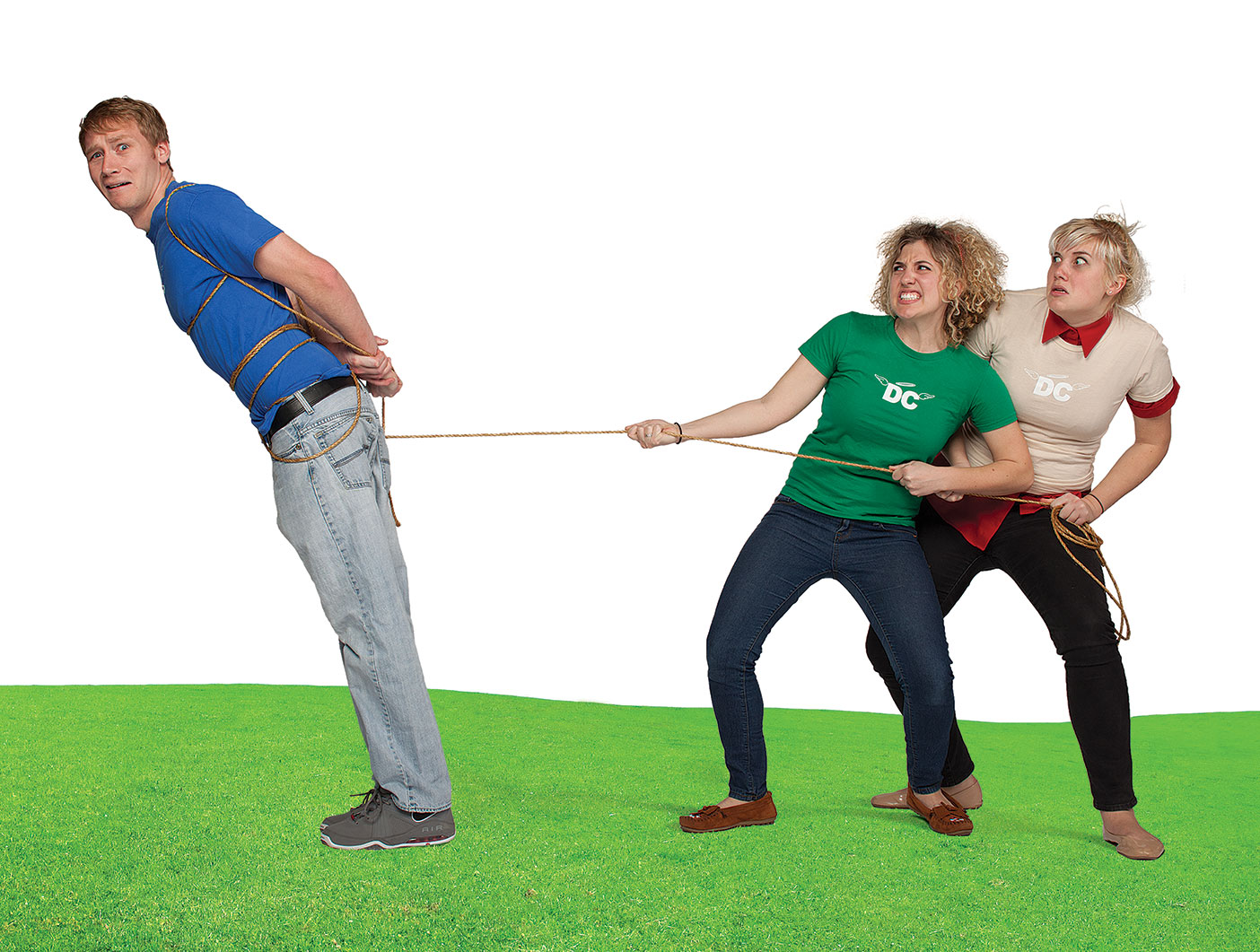
The next semester DC released another music video—a parody of the pop hit “Firework” called “Firebolt”—about young-adult Harry Potter fans doomed to a dreary life of mugglehood. (“Maybe the reason why your letter didn’t come / Is so you can stay protecting muggles as the Chosen One.”) The video got the attention of a major Potter fan site, and again, views soared.
This time, many of the YouTube comments came from non-Mormons who thanked the cast for the clean and clever humor. Everton notes that the video unintentionally sent the same message as the Church’s “I’m a Mormon” media campaign: “We’re saying, ‘Hey, we’re Mormons, and we’re normal. We laugh and we have fun.’”
And it’s not just their YouTube fan base that has expanded. They’re finding their live-show audiences now peppered with everyone from high schoolers (and younger) to middle-aged adults. “[Families] must get on YouTube and watch all these videos together,” says Everton. “How cool is that?”
Cast members note that, while BYU-themed jokes and headliners will always be part of Divine Comedy, they are taking care that not everything is an inside joke. Though most sketches still deal with themes on college students’ minds—classes, dating, roommates—fewer directly refer to BYU and Mormon culture.
Increased interest has had other manifestations: in September they maxed out the auditorium for two consecutive nights as crowds gathered to watch 111 hopefuls try out for just two open slots. And while shows would sell out before, now it happens in just hours. Gray says the enthusiasm has added pressure to be even funnier. “Before, I could write a sketch . . . before class and it would go fine,” he says. “Now I write it and rewrite it and get more group collaboration because the audience really expects more from us.”
Survival of the Funniest
“Once upon a night in Provo, while I browsed through Facebook photos . . .” The brooding voice over the speakers belongs to Whitney Call. Along with Matthew R. Meese (BS ’09), who is seated alone at center stage during the October 2011 show, Call wrote the spoof of Poe’s “The Raven.”
On the phone while I was yapping, suddenly there came a tapping,
As of someone gently rapping, rapping at my dorm room door.
Meese, who likes to write sketches where somebody gets burned—“That gives you something to react to; it always makes the stakes higher”—is about to be burned by girlfriend Mallory, who has come to talk relationships.
Not the smallest smile she gave me; not a minute stopped or stayed she;
But the cold and distant lady, wished to DTR so greatly
That I shyly asked if she would like to see me less or more.
“Less,” she said, “and nevermore.”
With the audience alternating between fits of laughter and sympathetic “ohhhs” for his plight, Meese closes the door to wallow in his sorrow.
Then entreating to my freezer, drowning thoughts of this foul creature,
Softly playing Justin Bieber to soothe the aching wounds I bore.
Dejectedly, and with some madness, I changed my current Facebook status
To “Single, single, single sadness,” sadness for the lost Mallor . . . y.
In the end, the sketch rates high on the cast members’ internal laugh-o-meters, that sense of how well a joke is playing with the audience. Other sketches also get big laughs, like Call’s night out with the Blind Date Who Must Not Be Named (played by Meese wearing a robe and a hideous bald cap).
Consistently producing belly laughter is harder than the DC cast makes it look. For James Perry, it began with a trip to a very serious place—the BYU library. Soon after winning a spot in Divine Comedy in fall 2010, he realized his high school gift for goofiness would need to be harnessed and refined to make for convincing comedy, so he checked out a book on humor. The hours studying up proved to be time well spent, as they yielded Perry’s first sketch, “Dead Wedding”—a situational mix-up in which the characters miscommunicate about their respective plans for a wedding and a funeral.
The group gets training from two (mostly hands-off) faculty advisors from theatre and media arts who instruct them on writing and help define what makes something funny (such as wit, exaggeration, recognition, or incongruity), and the cast makes annual pilgrimages to places like New York and Las Vegas to workshop with other groups. But DC’s artistry is honed mostly through trial and error.

“Not everything we write, obviously, is . . . golden,” says Gray, who notes that they come up with “five to 10 [sketch ideas] for every one that makes it into the show.” It’s an evolutionary process—call it survival of the funniest.
The process begins with the individual whimsical musings that cast members bring to their Tuesday/Thursday practices early in the semester. Sometimes these are written down, but at this point these sketch concepts tend to be pretty, well, sketchy.
“A lot of times I go into practice and I’m like, ’This is so funny,‘” says Gray. “And [then] I present it and get [only] a few chuckles. It’s like, ’yeah, back to the drawing board.‘” They keep pitching ideas until they have a raft of sketches to tweak and refine through small-group collaboration.
A month into the semester, as the cast enters the week of the first show, they vote on the sketches to determine which will survive and go on to the “Tech Show,” a Wednesday-night rehearsal before a large live audience (primarily students grateful for a free date). Pencil and paper in hand, the audience rates each sketch and provides comments. But more important than anything written are the sounds the audience makes—or doesn’t make, depending on how a given sketch is playing. The cast is particularly attuned to silence or an uncomfortable rustle.
Divine Comedy has always steered clear of jokes about certain topics—things sacred, Church doctrines, and General Authorities (except, perhaps, Gray’s spot-on impersonation of President Uchtdorf, which a grandson assured him would get a thumbs-up from the source). But audience feedback helps them define the line dividing what’s in and what’s out of bounds. For instance, they quickly learned that a sketch involving Mr. Rogers just wasn’t funny. Baby dolls can be funny as props, but only when they’ve clearly been identified as plastic dolls. BYU football can be joked about when—and only when—the team is really bad. Some things are just too close to the audience’s heart.
And they’ve been careful not to let the DC brand of humor degrade from yuks to yuck. While shock-value humor is the norm in comedy today, Call says Divine Comedy’s high-road approach motivates them “to come up with fresher ways of making something funny. It’s a fun constraint to play in.”
Although Divine Comedy figures it knows its audience well, Tech Show can still yield surprises. “Sometimes . . . we think [a sketch] is going to bomb and it soars, and sometimes we think it’s going to be amazing and it flops,” says Meese. “It happens enough that it humbles you and makes you realize you don’t always know what you’re doing.”
Believing that the audience knows best, the cast spends Thursday night implementing the feedback—overhauling jokes, reworking scenes, cutting entire sketches, and polishing everything else.
As the line begins to form outside the auditorium doors before the first Friday show, the cast is confident enough about the process that nobody seems to be sweating the impending show. Instead, they sit in circles on the stage and laugh about school and boyfriends and housing contracts as they eat dinner and crack hundreds and hundreds of glow sticks.
That’s not to say everything in the show goes as planned. But missteps and missed lines only add to the hilarity as the cast improvises and laughs along with the audience. “If we have a good time,” says new cast member Stacey J Harkey (’13), “it seems like everyone else does too.” And they keep learning with each presentation, making the fourth and final show of the weekend the funniest and most polished.
It was this sort of an evolutionary process that transformed a simple concept first performed in fall 2008—“The Shoulder Angel”—into DC’s signature piece. In the sketch and in a handful of adaptations, Meese plays various shoulder-dwelling advisors—from an angel to a leprechaun to Cupid. In each role, he counsels another cast member, but not before scaling up the actor’s back and perching atop one shoulder. When the audience voted on Facebook for a winter 2011 “Angel” reprise to be included in the semester-ending Best of DC show, Meese decided to spread his wings and go for gusto. In truly angelic (and acrobatic) fashion, this version had Meese dispensing advice from three different cast members’ shoulders—without touching the ground in between.
In the November 2011 show, when Meese appears in horns, cape, and an overstuffed red suit, the giggling audience can already see where this is going. Despite the rotund shoulder devil’s most nefarious efforts to encourage Gray to steal from an old woman, the hapless tempter finds that his every suggestion results in a serendipitous lesson in virtue—like when the granny misunderstands Gray’s intentions and gives him the money as a reward for honesty. “That kind of thing doesn’t even happen in seminary videos,” Meese laments as the audience roars with laughter. They are clearly having a wicked good time.
Comedy Therapy
Two days after the Saturday shows in November 2011, one might be excused for not recognizing James Perry in the Wilkinson Center. Over the weekend he played, among other roles, Harry Potter, a “hug dealer,” Jerry Seinfeld, and a senile Will Turner (from Pirates of the Caribbean) who believes he’s the elf Legolas (from Lord of the Rings). But today he’s filling the role of an overwhelmed college student, and his exuberance has been replaced with the distracted expression of an engineering major in the throes of a perplexing assignment for his computer science class.
Seeing the cast on stage and on YouTube, it’s easy to forget that Divine Comedy is made up of students who face the same stresses, uncertainty, and trials as their peers. Between practices and performances, they stew over GPAs, work part-time jobs, and fall in and out of love.
But riding the roller coaster of college life has its benefits, says Whitney Call, not the least of which is a goldmine for comedy. For Call, who in high school studied drama therapy—where participants work through challenging or traumatic scenarios by acting them out—comedy provides a way to deal with her insecurities. Calling herself “hypersensitive to awkward situations,” she builds awkward moments into nearly every sketch she writes. In one she plays a freshman taking an Independent Study marriage-prep course about landing the first kiss. She practices longing looks on what she thinks is the enclosed inflatable dummy but turns out to be her roommate’s brother. “I take everything that makes me uncomfortable and makes me squirm,” she says, “and I write it out and do it.”
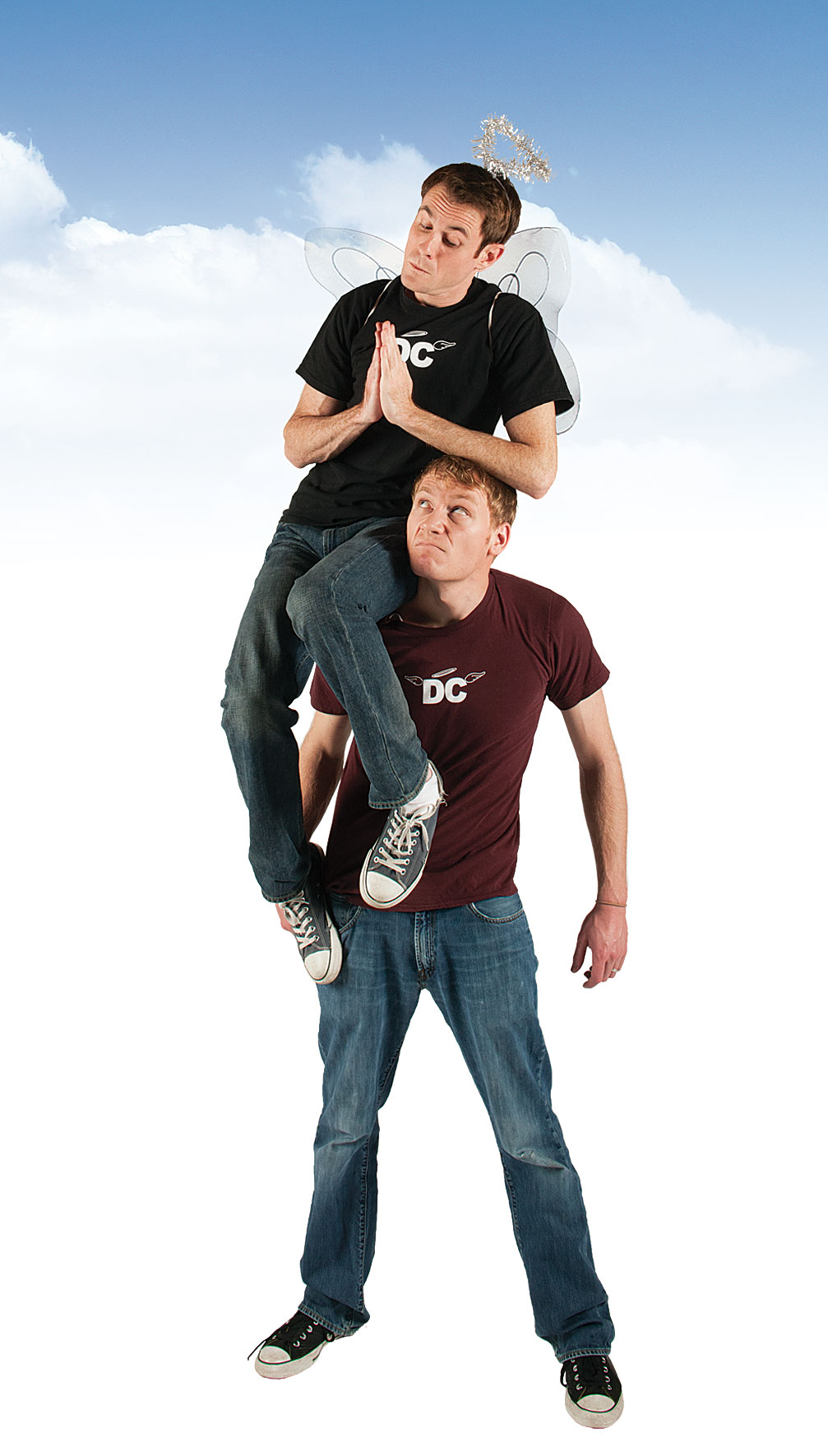
Divine Comedy advisor and associate professor of theatre and media arts George D. Nelson (BA ’77) sees this sort of humor as an antidote to the pressures that can plague college life and life in general. “People are too serious,” he says. “Humor is a way to celebrate life.” And he adds, “With comedy we can laugh at the things we suffer through, we can enjoy time together [laughing] about the humanity of it.”
In the two years since he joined Divine Comedy, Jason Gray has experienced a lot of great moments—from starring in the headliner “How the Grinch Stole BYU Football” to bringing down the house with his Bill Cosby impersonation. But he says his favorite memory came when he wasn’t even on stage. Instead, he was behind a screen that allowed him to watch the audience without being seen. “I remember looking out and seeing . . . every single person . . . with either a huge smile or laughing out loud,” he recalls. “It just made me realize that all the work we put into this really is worth it. It’s important to a lot of people, not just us. It has been a service to the campus and . . . a great blessing for each of us.”
From DC to BYUtv
From students packing campus venues to Internet surfers enjoying the Divine Comedy YouTube channel, DC’s following has multiplied over the years. This October BYUtv will let a worldwide television audience in on the fun.
Called Common Room, the TV spin-off will feature several of the more experienced cast members and occasional DC alumni performing all-new sketches aimed at a non-BYU audience. However, to shoot the show’s pilot, they relied on some DC favorites—including “Shoulder Angel.” Get a sneak preview with the video at the top of this page (if you haven’t already).
Jennifer G. Jones (’12) contributed to the reporting on this article.
Feedback: Send comments on this article to magazine@byu.edu.


